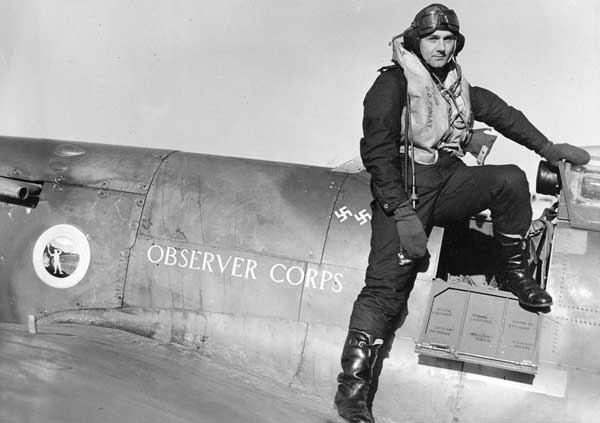Spitfire P8043 near Kiplin, Catterick.
On 7th June 1941 this 41 Squadron aircraft suffered engine failure and the pilot made a wheels up landing in a small ploughed field a mile east of Catterick airfield
in the Ellerton / Kiplin area in the late morning. The time for the incident differs between sourced files, from 11.40hrs to 12.00hrs between the RAF Form AM1180
and police report; though the later police time possibly related to when they were called out. The pilot was not injured in the landing and at the time of
this incident he had a total of 185 hours flying on Spitfires and a total flying time in all aircraft of 1355hrs.
Pilot - S/Ldr Donald Osborne Finlay RAF (36031).
Don Finley was born in May 1909 in Christchurch, Hampshire. He joined the RAF in 1925 as an aircraft apprentice at Halton and received his commission in 1935.
Prior to the outbreak of the War he had served with 17 Squadron and 54 Squadron. After a spell away from 54 Squadron he returned to command them and later
41 Squadron in the Battle Britain. On 28th September 1940 he was flying 54 Squadron Spitfire X4053 in combat and was attacked by enemy aircraft, he baled out
of the damaged Spitfire which crashed near Westbere Lake, Canterbury and he sustained slight injuries. On 1st October 1940 he was back in the air and shot
down a Bf109 over Sussex. On 9th October 1940 he was the pilot of Spitfire X4558 with 41 Squadron which was damaged in Combat with enemy aircraft and he forced
landed near Hornchurch. On 24th November 1940 he shot down a further Bf109 and its pilot force landed near Ivychurch. Back in Yorkshire in March 1941 he crash
landed Spitfire X4774 at Catterick. He was awarded the DFC for service with 41 Squadron, Gazetted on 10th April 1942, the citation reads..
"From September 1940, to August 1941, Wing Commander Finlay was the commanding officer of No.41 Squadron. He participated in many sorties during which
he destroyed at least three enemy aircraft in combat. On one sortie, he attacked a German ship, leaving it a mass of flames. During the period his squadron
destroyed 66 enemy aircraft. Since joining his present unit, Wing Commander Finlay has participated in several sorties. On 3rd March 1942, he destroyed a
Messerschmitt 109 following a courageous head-on attack, thus bringing his victories to four. This officer has always shown great keenness and he has set
a splendid example to all."
He later commanded 608 Squadron and 906 Squadron. As Acting G/C he was awarded the AFC, Gazetted on 1st September 1944 (but no citation has yet been found).
Alongside his RAF career he was an Olympic athelete. He first ran for Great Britain in the 1932 Summer Olympics in Los Angeles and won the 110m hurdles Bronze
Medal and again in 1936 in Berlin he won the silver in the same race. He was also the GB team captain in the Berlin Olympics. Having survived the War he took
part in the 1948 Olympics in London at the age of forty but did not gain any other medals but his time was only one tenth of a second slower than his time
before the War. He is widely regarded as the greatest high-hurdler in GB history perhaps only Colin Jackson being as good. He took part in British Empire
Games in 1935 and won Gold and in the European Championships in 1938 and again won Gold. His athletics career ran alongside his military one. He retired
from the RAF with the rank of Group Captain in 1959 but was paralysed in a car accident in 1966. He died in April 1970.

Spitfire P8043 was built as a MkIIa to contract B981687/39 by Vicker Armstrong's Ltd at Castle Bromwich and was delivered to 45 MU at Kinloss on 23rd February 1941.
It was issued to 41 Squadron at Catterick on 5th April 1941. In the aircraft's history there is no mention of an accident, so damage must only have been a very minor
after the forced landing. The aircraft remained on charge with 41 Squadron until transferred to 504 Squadron at Ballyhalbert on 2nd November 1941 and it moved with
the unit to Kirkistown on 22nd January 1942. It suffered a Cat.A(c)/FA incident after it took off at Kirkistown with the propeller set in a course pitch, this caused
it to fail to take off and run off the end of the runway. It was sent to Supermarine for repair but re-assessed and Re.Cat.E and struck off charge on 28th May 1942.